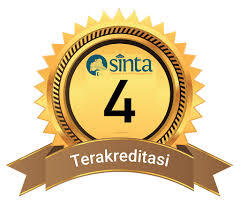Pendidikan Islam berbasis Adiwiyata di MAN I Mojokerto: Implementasi dan Normativitas Qur’ani
 Abstract views: 473
,
Abstract views: 473
,
 PDF downloads: 287
PDF downloads: 287
Abstract
Environmental damage occurs due to human actions or natural events. To prevent humanity from being destructive, awareness of environmental preservation needs to be fostered through education. This article aims to discuss the relationship between human and environmental perspective of the Koran. MAN I Mojokerto became the subject of this research using the theory of developing ecological citizenship with the Talcot Parsons system approach, which was then reviewed with the perspective of the Koran to find its relevance. The results showed that the environmental education (PLH) based on Adiwiyata in MAN I Mojokerto was well implemented, manifested in the level of policy, curriculum, action activities, and fulfillment of facilities and infrastructure. The implementation of this PLH has strong relevance to the teachings of the Koran about environmental preservation, which lies in the understanding that; because man is the caliph of Allah, he is tasked with prospering the earth and its environment. As a consequence, he must carry out the mandate to prosper the earth, in addition to having the right to use the environment for the benefit of his life, he also has an obligation to preserve it.
Downloads
References
Abd. Muin Salim. “Metode Dakwah untuk Menanggulangi Lahan Kritis, Sebuah Telaah Qur’ani,” dalam Tim Peneliti IAIN Alauddin, Perumusan Model Dakwah dalam Pelaksanaan Penanggulangan Lahan Kritis di Sulawesi Selatan, (Laporan Penelitian), Kerjasama BAPPEDA Tingkat I Sulawesi Selatan dengan Pusat Penelitian dan Pengabdian pada Masyarakat. Ujung Pandang: IAIN Alauddin, 1989/1990.
Al-Ashfahani, Abu al-Qasim Abu al-Husain bin Muhammad al-Raghib. Al-Mufradat fi Gharib al-Qur’an. Beirut: Dar al-Fikr, t.th.
Al-Baqy, Muhammad Fuad ‘Abd. Al-Mu’jam al-Mufahras li Alfaz al-Qur’an al-Karim. Maktabah Dahlan, Indonesia, t.th.
AlGore. Earth in the Balance : Ecology and the Human Spirit. Boston: Houghton Mifflin Company, 1990.
al-Jamal, Muhammad Abd al-Mun’im. Tafsir al-Farid, Jilid I. Mesir: Dar al-Kutub al-Jadid, t.th.
al-Maraghi, Ahmad Mushthafa. Tafsīr al-Marāghī, Jilid VIII. Mesir: Syirkah Maktabah wa Mathba’ah Bab al-Halabi, 1963.
Al-Marbawi, Idris. Kamus al-Marbawi, Jilid I. Mesir: Mushtafa Bab al-Halbi, 1350 H.
Al-Munawwir, A.W. Al-Munawwir Kamus Arab Indonesia. Yogyakarta: Pondok Pesantren al-Munawwir, 1984.
Al-Najjar, ‘Abd. Wahab. Qishash al-Anbiyā’. Beirut: Dar al-Fikr, 1988.
Al-Qurthuby, Abu ‘Abdillah Muhammad bin ahmad Al-Jāmi’ li Ahkām al-Qur’ān, Jilid IX. Mesir: Dar al-Katib al-‘Araby, 1967.
Al-Zamakhsyari, Al-Kasysyāf ‘an ¦aqāiq at-Tanzīl wa ‘Uyūn al-Aqāwīl fī Wujūh at-Ta’wīl, Jilid II. Mesir: Maktabah Mesir, t.th.
Anis, Ibrahim et al. Al-Mu’jam al-Wasith, Jilid I. Kairo: t.p., 1972.
Ba’albaki, Munir. Al-Mawrid A Modern English-Arabic Dictionary. Beirut: Dar al-‘Ilm li al-Malayīn, 1979.
Farid Wajdi, Muhammad. Tafsir al-Mufassar al-Mushhaf, Jilid I. Kairo: al-Sya’ab, t.th.
Ibrahim, Muhammad Ismail. Mu’jam al-Alfāzh wa al-A’lām al-Qur’āniyah, Jilid II. Kairo: Dar al-Fikr al-Arabi, 1969.
Katsir, Abu al-Fida’Ismail Ibn. Tafsīr al-Qur’ān al-‘Azīm, Jilid III. Singapura: al-Haramain, t.th.
Ma’luf, Louis. Al-Munjid fi al-Lughah, Cet. XXVIII. Bairut: Dar al-Masyriq, 1986.
Madjid, Nurcholis. Pintu Pintu Menuju Tuhan. Jakarta: Paramadina, 1995.
Mary Antonette A. Beroya, A People’s Guide Book to the Environment. Hongkong: Documentation for Action Groups in Asia (DAGA), 1995.
Mihna, Ahmad Ibrahim. Tabwih Ayi al-Qur’an min al-Nahiyah al-Mawdh’iyah, Jilid III. Mesir: Dar al-Sya’ab, t.th.
Mukani, dan Sumarsono, Teto. “Pendidikan Karakter Peduli Lingkungan berbasis Adiwiyata pada Mata Pelajaran Fiqih di MTsN Tambakberas Jombang”. Jurnal Pendidikan Agama Islam (Journal of Islamic Education Studies) Vol. 5, No. 2 (2017).
Nasr, Seyyed Hossein. “Islam and the Environmental Crisis” dalam The Islamic Quarterly, Vol. XXXIV, No. 4 (1990).
Nasr, Seyyed Hossein. An Introduction to Islamic Cosmological Doctrines, edisi revisi, terbit pada 1978 oleh Shambhala Publications Inc., Boulder Theo Huijbers, Manusia Merenungkan Dunia. Yogyakarta: Yayasan Kanisius, 1986.
Perkins, Henry C. Air Pollution. Tokyo: McGraw-Hill Kogakusha Ltd., 1974.
Rahardjo, Dawam. “Etika Lingkungan dan Teknologi” dalam Republika, 25 Juli 1996.
Rahman, Fazlur. Tema Pokok al-Qur’an. Bandung: Pustaka, 1980.
Ricklefs, Robert E. Ecology. New York & Concord: Chiron Press, 1973,
Sadily, Hassan et al., Ensiklopedi Indonesia, Jilid I. Jakarta: Ichtiar Baru-Van Hoeve, 1980.
Sargent II, Frederick. “Nature and Scope of Human Ecology” dalam Frederick Sargent II, Human Ecology. North Holland Publication Co, 1974.
Shihab, M. Quraish. Ensiklopedi Al-Qur’an. Jakarta: Yayasan Bimantara, 1997.
Shihab, M. Quraish. Membumikan Al-Quran. Bandung: Mizan, 1997.
Shihab, M. Quraish. Tafsir al-Mishbah, Vol. I. Jakarta: Lentera Hati, 2000.
Soemarwoto, Otto. Ekologi Lingkungan Hidup dan Pembangunan. Jakarta: Djambatan, 1983.
Soemarwoto, Otto. Indonesia dalam Kancah Isu Lingkungan Global. Jakarta: Gramedia Pustaka Utama, 1992.
Zakariya, Abu al-Husain Ahmad Ibn Faris bin. Mu’jam Maqayis al-Lughah. Dar al-Fikr, Bairut, 1994.
Copyright (c) 2021 TADRIS: Jurnal Pendidikan Islam

This work is licensed under a Creative Commons Attribution-NonCommercial 4.0 International License.
The journal operates an Open Access policy under a Creative Commons Non-Commercial 4.0 International license. Authors who publish with this journal agree to the following terms:
- Authors retain copyright and grant the journal right of first publication with the work simultaneously licensed under a
 Commons Attribution-NonCommercial 4.0 International License
Commons Attribution-NonCommercial 4.0 International Licensethat allows others to share — copy and redistribute the material in any medium or format, and adapt — remix, transform, and build upon the material.
- Authors are able to enter into separate, additional contractual arrangements for the non-exclusive distribution of the journal's published version of the work (e.g., post it to an institutional repository or publish it in a book), with an acknowledgement of its initial publication in this journal.
- Authors are permitted and encouraged to post their work online (e.g., in institutional repositories or on their website) prior to and during the submission process, as it can lead to productive exchanges, as well as earlier and greater citation of published work (see The Effect of Open Access).














